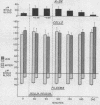Abstract
For decades, investigators concerned with protein metabolism in man have performed detailed amino acid analyses of human plasma obtained under a wide range of experimental situations. A large body of information has been used to calculated rates of protein synthesis and proteolysis. During the course of an investigation of the effect of intrabrachial artery infusion of insulin (70 μU/min per kg body weight) on glutamate uptake by human forearm muscle, it was discovered that plasma arterio-deep venous glutamate difference analysis failed to document any increase in the uptake of this amino acid, suggesting that insulin had little influence on glutamate uptake by muscle. However, whole blood glutamate analyses, performed on the same blood samples, revealed that (a) the resting muscle uptake of glutamate is smaller than previously reported and (b) insulin is capable of markedly increasing glutamate uptake by muscle from whole blood. Since the hematocrit was obtained on all samples, detailed analyses of the various compartments in which glutamate could be found were performed. It was determined that circulating blood cells have a dynamic role in glutamate transport. These data underscore the need for both whole blood and plasma amino acid analysis in investigations concerned with protein synthesis and/or amino acid flux, for analysis of plasma samples alone could be misleading as illustrated in the present study.
Full text
PDF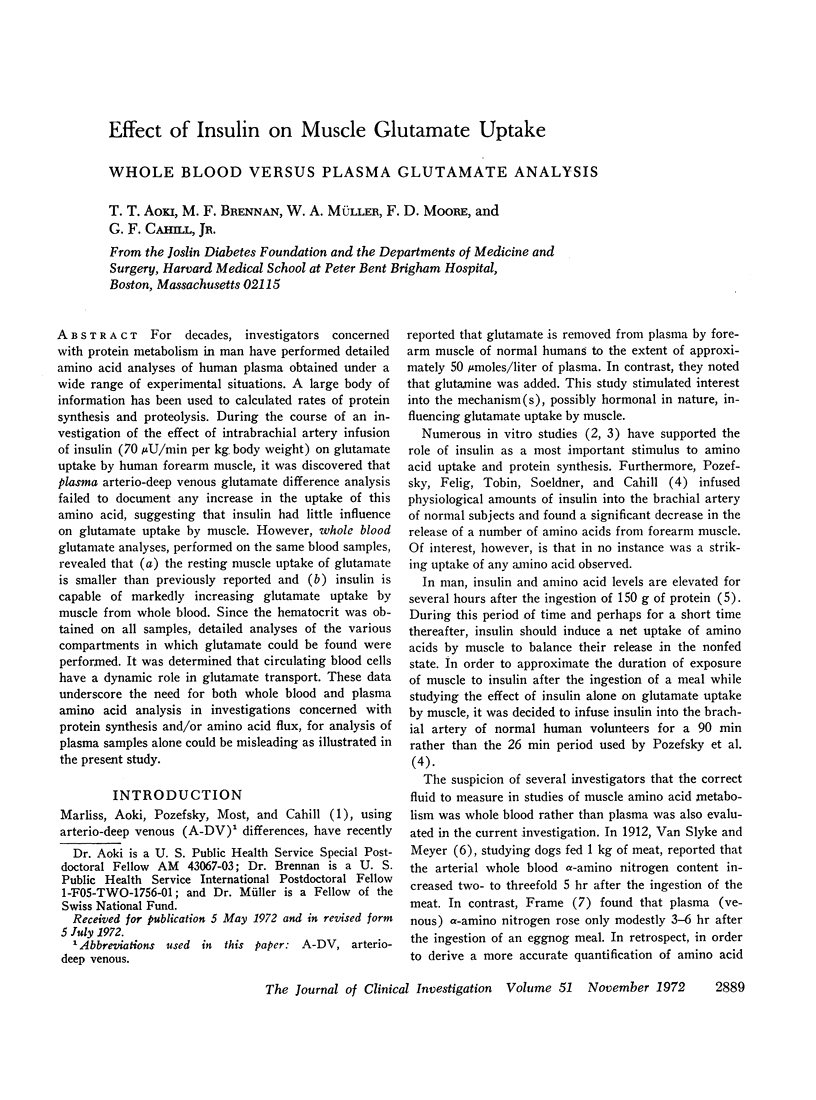
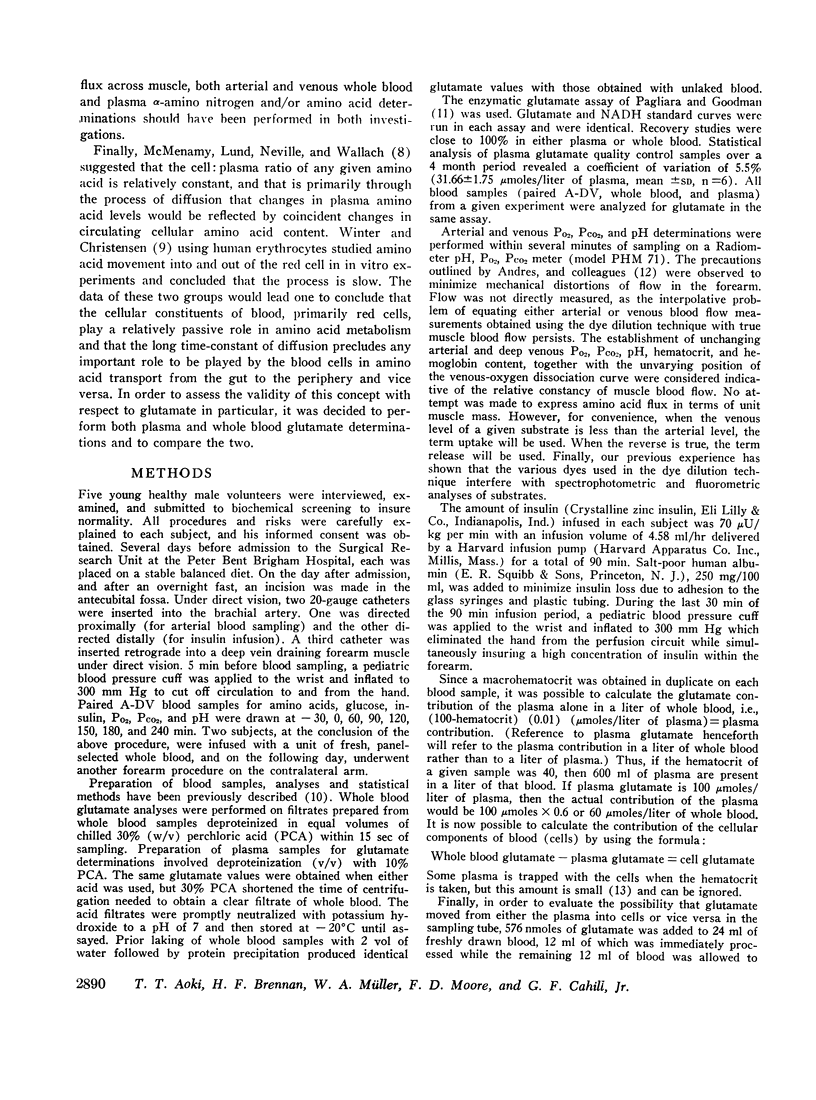
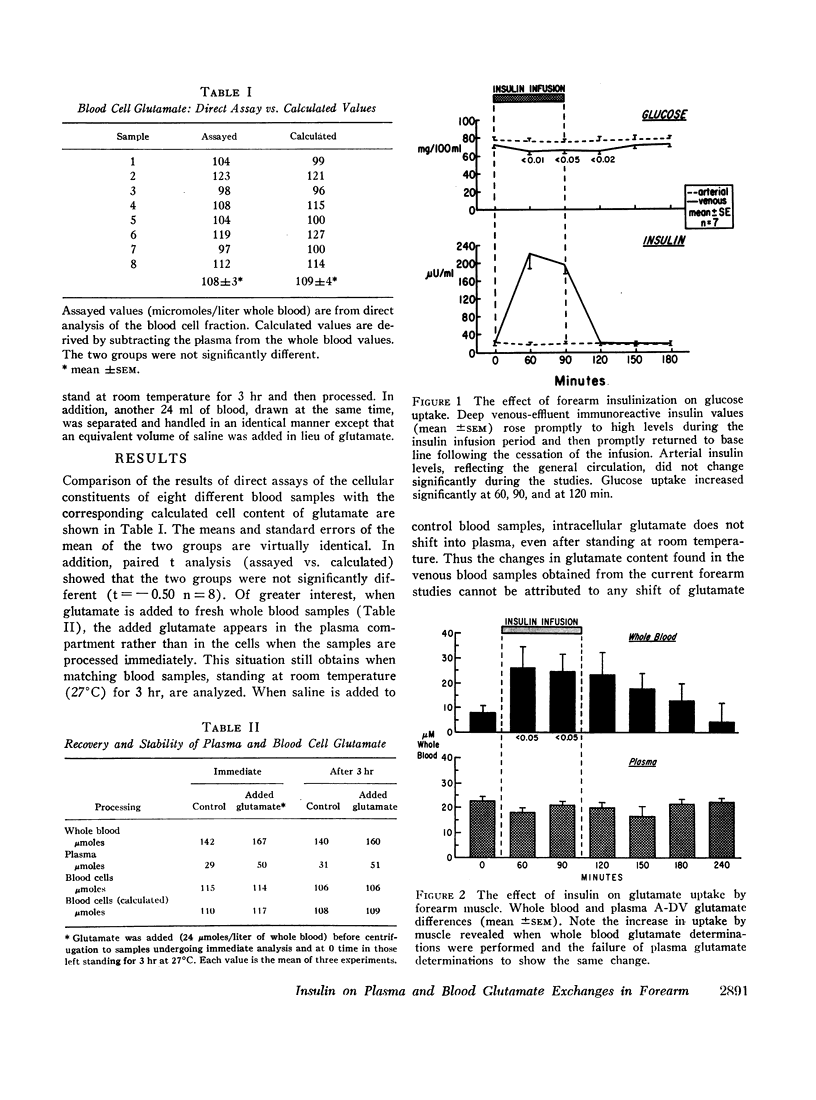
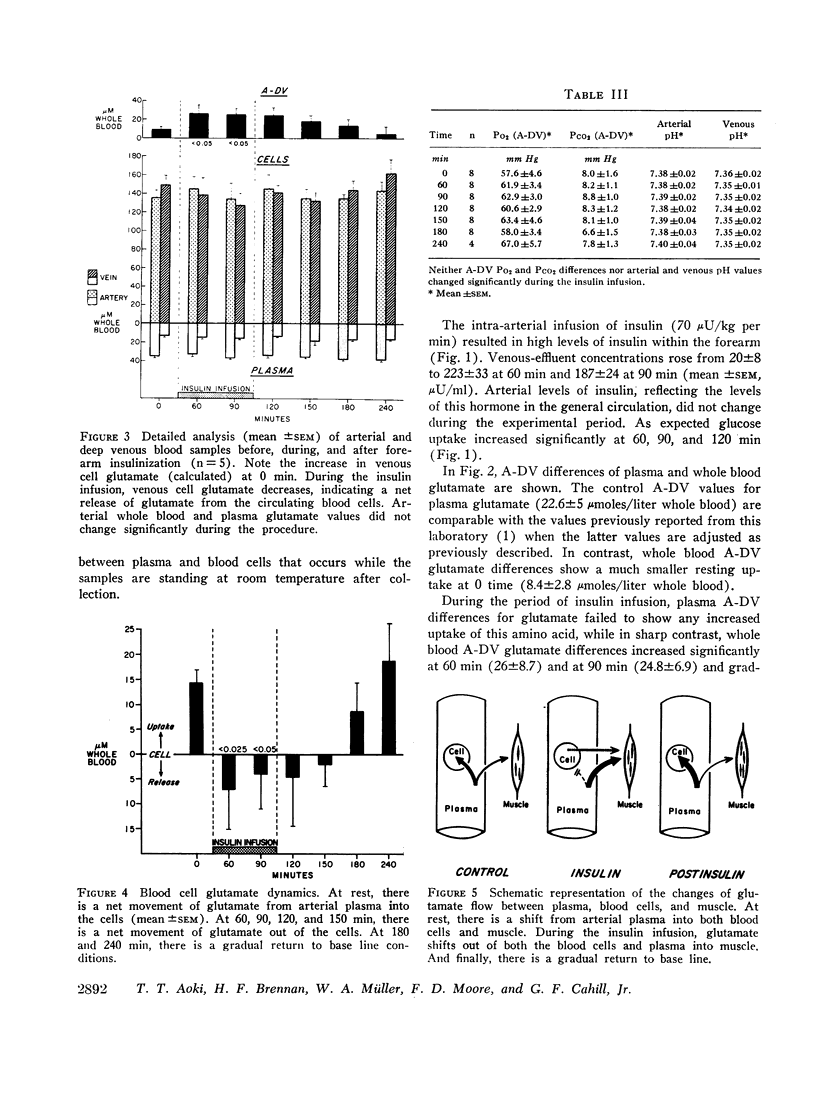
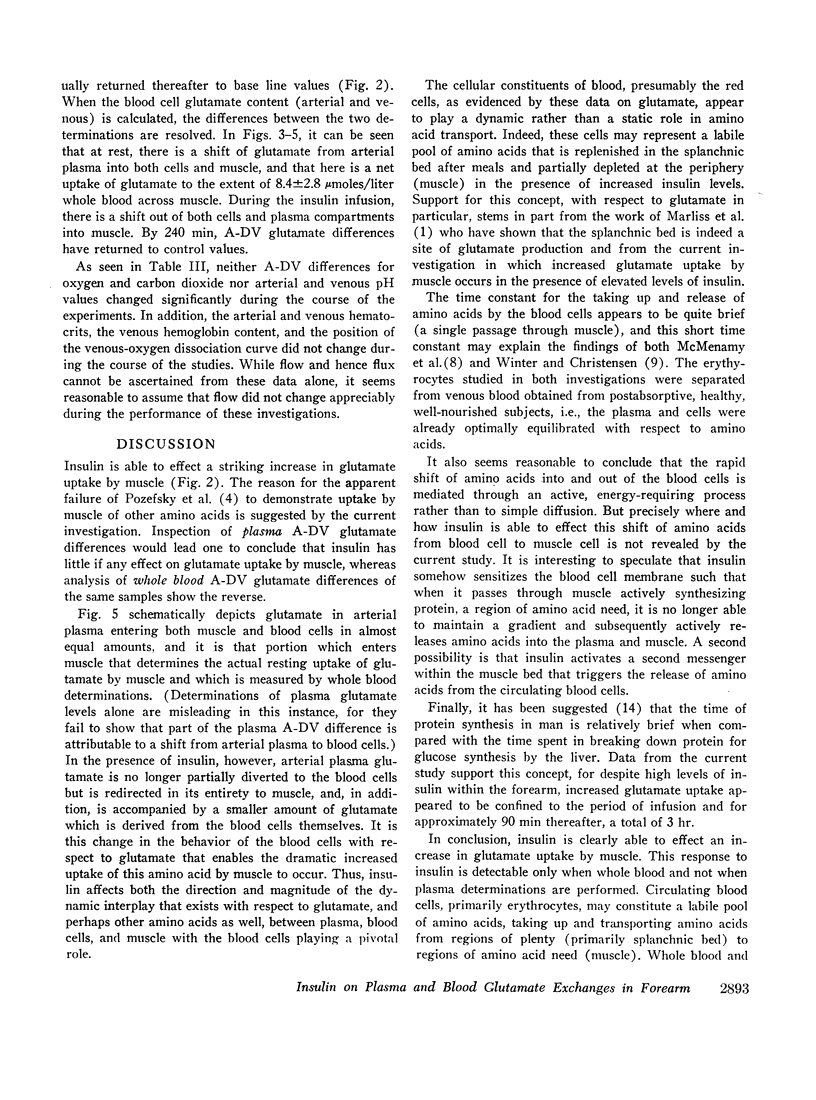
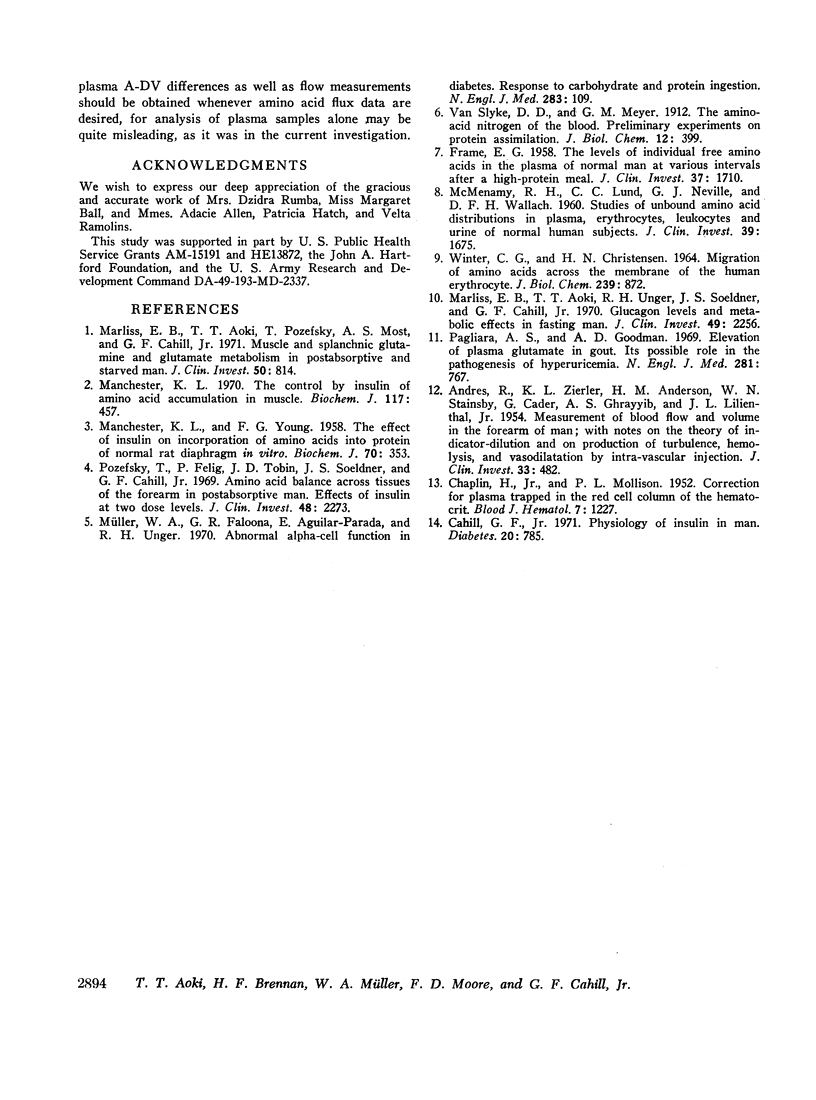
Images in this article
Selected References
These references are in PubMed. This may not be the complete list of references from this article.
- ANDRES R., ZIERLER K. L., ANDERSON H. M., STAINSBY W. N., CADER G., GHRAYYIB A. S., LILIENTHAL J. L., Jr Measurement of blood flow and volume in the forearm of man; with notes on the theory of indicator-dilution and on production of turbulence, hemolysis, and vasodilatation by intra-vascular injection. J Clin Invest. 1954 Apr;33(4):482–504. doi: 10.1172/JCI102919. [DOI] [PMC free article] [PubMed] [Google Scholar]
- CHAPLIN H., Jr, MOLLISON P. L. Correction for plasma trapped in the red cell column of the hematocrit. Blood. 1952 Dec;7(12):1227–1238. [PubMed] [Google Scholar]
- Cahill G. F., Jr The Banting Memorial Lecture 1971. Physiology of insulin in man. Diabetes. 1971 Dec;20(12):785–799. doi: 10.2337/diab.20.12.785. [DOI] [PubMed] [Google Scholar]
- FRAME E. G. The levels of individual free amino acids in the plasma of normal man at various intervals after a high-protein meal. J Clin Invest. 1958 Dec;37(12):1710–1723. doi: 10.1172/JCI103763. [DOI] [PMC free article] [PubMed] [Google Scholar]
- MANCHESTER K. L., YOUNG F. G. The effect of insulin on incorporation of amino acids into protein of normal rat diaphragm in vitro. Biochem J. 1958 Nov;70(3):353–358. doi: 10.1042/bj0700353. [DOI] [PMC free article] [PubMed] [Google Scholar]
- Manchester K. L. The control by insulin of amino acid accumulation in muscle. Biochem J. 1970 Apr;117(3):457–465. doi: 10.1042/bj1170457. [DOI] [PMC free article] [PubMed] [Google Scholar]
- Marliss E. B., Aoki T. T., Pozefsky T., Most A. S., Cahill G. F., Jr Muscle and splanchnic glutmine and glutamate metabolism in postabsorptive andstarved man. J Clin Invest. 1971 Apr;50(4):814–817. doi: 10.1172/JCI106552. [DOI] [PMC free article] [PubMed] [Google Scholar]
- Marliss E. B., Aoki T. T., Unger R. H., Soeldner J. S., Cahill G. F., Jr Glucagon levels and metabolic effects in fasting man. J Clin Invest. 1970 Dec;49(12):2256–2270. doi: 10.1172/JCI106445. [DOI] [PMC free article] [PubMed] [Google Scholar]
- McMenamy R. H., Lund C. C., Neville G. J., Wallach D. F. STUDIES OF UNBOUND AMINO ACID DISTRIBUTIONS IN PLASMA, ERYTHROCYTES, LEUKOCYTES AND URINE OF NORMAL HUMAN SUBJECTS. J Clin Invest. 1960 Nov;39(11):1675–1687. doi: 10.1172/JCI104191. [DOI] [PMC free article] [PubMed] [Google Scholar]
- Müller W. A., Faloona G. R., Aguilar-Parada E., Unger R. H. Abnormal alpha-cell function in diabetes. Response to carbohydrate and protein ingestion. N Engl J Med. 1970 Jul 16;283(3):109–115. doi: 10.1056/NEJM197007162830301. [DOI] [PubMed] [Google Scholar]
- Pagliara A. S., Goodman A. D. Elevation of plasma glutamate in gout. Its possible role in the pathogenesis of hyperuricemia. N Engl J Med. 1969 Oct 2;281(14):767–770. doi: 10.1056/NEJM196910022811405. [DOI] [PubMed] [Google Scholar]
- Pozefsky T., Felig P., Tobin J. D., Soeldner J. S., Cahill G. F., Jr Amino acid balance across tissues of the forearm in postabsorptive man. Effects of insulin at two dose levels. J Clin Invest. 1969 Dec;48(12):2273–2282. doi: 10.1172/JCI106193. [DOI] [PMC free article] [PubMed] [Google Scholar]
- WINTER C. G., CHRISTENSEN H. N. MIGRATION OF AMINO ACIDS ACROSS THE MEMBRANE OF THE HUMAN ERYTHROCYTE. J Biol Chem. 1964 Mar;239:872–878. [PubMed] [Google Scholar]



